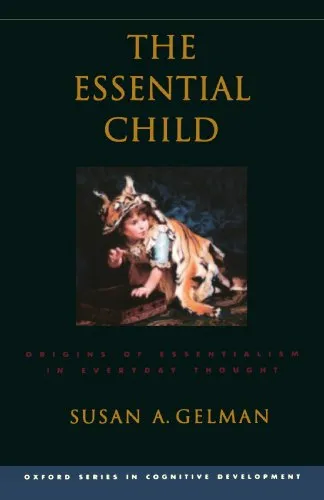The essential child : origins of essentialism in everyday thought
4.7
بر اساس نظر کاربران

شما میتونید سوالاتتون در باره کتاب رو از هوش مصنوعیش بعد از ورود بپرسید
هر دانلود یا پرسش از هوش مصنوعی 2 امتیاز لازم دارد، برای بدست آوردن امتیاز رایگان، به صفحه ی راهنمای امتیازات سر بزنید و یک سری کار ارزشمند انجام بدینکتاب های مرتبط:
خلاصه تحلیلی کتاب
کتاب The essential child : origins of essentialism in everyday thought پژوهشی عمیق و بینرشتهای در زمینه رشد شناختی کودکان و جایگاه باورهای Essentialism در شکلدهی به درک و برداشتهای آنان است. نویسنده با رویکردی علمی و مبتنی بر شواهد، این ایده را بررسی میکند که چگونه کودکان بهطور طبیعی تمایل دارند به دستهبندیهای ثابت و ماهوی باور پیدا کنند. این گرایش، به آنها کمک میکند دنیا را بهتر سامان دهند اما گاه میتواند منجر به برداشتهای غلط یا تعصبهای شناختی شود.
ساختار کتاب به گونهای طراحی شده که خواننده، هم با پشتوانههای نظری Essentialism آشنا میشود و هم نتایج مطالعات تجربی را درک میکند. در سراسر فصلها، ارتباط میان توسعه زبانی، دستهبندی مفهومی و باورهای ماهوی بهخوبی کاوش شده است. اثر حاضر از زبان تخصصی استفاده میکند اما همچنان برای خواننده جدی و پژوهشگر حوزههای روانشناسی، علوم شناختی و آموزش، قابلفهم باقی میماند.
نکات کلیدی و کاربردی
یکی از نکات کلیدی کتاب، این است که Essentialism نهتنها در بزرگسالان بلکه از سنین بسیار پایین درک کودکان نفوذ دارد. این واقعیت، پیامدهای مهمی برای آموزش، پرورش و حتی بازخوردهای اجتماعی دارد. نویسنده نشان میدهد که چگونه معلمان و والدین میتوانند با درک این گرایش، به شکلدهی مفهومی متعادلتر در ذهن کودک کمک کنند.
دیگر نکته برجسته، بررسی تفاوتهای بین فرهنگی در این گرایش شناختی است. یافتهها بیانگر آناند که اگرچه ساختار ذهن بشر تمایل به Essentialism دارد، اما جزئیات و شدت این گرایش تحت تأثیر فرهنگ، زبان و تجارب محیطی شکل میگیرد. این امر اهمیت پژوهشهای تطبیقی را دوچندان میکند.
کاربرد عملی مباحث کتاب در طراحی برنامههای آموزشی، گفتگو با کودکان درباره تفاوتها و شباهتهای افراد، و نیز در تربیت شهروندان آگاه است. برای نمونه، وقتی کودک یاد میگیرد که ویژگیهای اشیاء یا موجودات لزوماً ریشه در ماهیت ثابت آنها ندارد، میزان انعطافپذیری شناختی او افزایش مییابد.
نقلقولهای ماندگار
کتاب حاوی گزارهها و ایدههایی است که در ذهن خواننده ماندگار میشود. این نقلقولها نهتنها بازتاب اندیشه علمی نویسنده را نشان میدهند، بلکه چشماندازی تازه برای ادامه پژوهش فراهم میکنند.
هرچند بهدلیل محدودیتهای حقوقی نمیتوان عین متن کتاب را آورد، اما میتوان چکیده پیام برخی بخشها را در قالب دیدگاههای کلیدی ارائه داد.
کودکان جهان را نهتنها آنگونه که میبینند، بلکه آنگونه که گمان میکنند باید باشد، دستهبندی میکنند. نامشخص
باور به ماهیتهای ثابت، میتواند پل شناختی یا مانع فکری باشد؛ بستگی دارد چگونه با آن روبهرو شویم. نامشخص
چرا این کتاب اهمیت دارد
اهمیت The essential child : origins of essentialism in everyday thought در آن است که رویکردی جامع و مستند به نحوه شکلگیری باورهای بنیادین در کودکان ارائه میدهد. این کتاب بستری برای فهم علمی و دقیق سازوکارهای ذهنی فراهم میکند که پیامدهای مستقیم بر آموزش، تربیت و تعاملات اجتماعی دارند.
با توجه به اینکه Essentialism بخشی ریشهدار از شناخت انسانی است، آگاهی و نقد این گرایش میتواند از گسترش تفکرات قالبی و کلیشهای جلوگیری کند. اثر حاضر با پیوند دادن یافتههای علمی به مثالهای عینی، مسیر عملی برای پژوهشگران و مربیان ترسیم میکند.
نتیجهگیری الهامبخش
کتاب The essential child : origins of essentialism in everyday thought ما را دعوت میکند تا نگاه
Analytical Summary
The essential child : origins of essentialism in everyday thought is a foundational work in developmental psychology, authored by Susan A. Gelman. It examines how children develop the intuitive belief that certain categories — especially those linked to living kinds — possess an underlying, invisible essence that defines their identity and properties. This “essentialist” tendency influences how humans reason, categorize, and make inferences from an early age, shaping social attitudes and scientific understanding alike.
Drawing upon empirical research, cross-cultural findings, and detailed analysis of language development, the book explores why humans are prone to think in terms of essences and how this impacts cognitive development. Gelman highlights the interaction between innate biases and environmental input, showing that essentialism emerges reliably across different contexts. The work integrates perspectives from philosophy, anthropology, and biology to elucidate how essentialist thought can both guide adaptive reasoning and perpetuate stereotypes.
The volume’s analytical framework positions essentialism not as a mere flaw in human reasoning, but as a pervasive and influential cognitive pattern. It considers implications for education, science communication, and social policy, urging readers to recognize the strengths and limitations that this mental habit introduces into judgment and decision-making.
Key Takeaways
Readers will come away from The essential child : origins of essentialism in everyday thought with a deeper appreciation of how essentialist bias shapes human understanding from early childhood onward.
Essentialist thinking is not confined to adults; it manifests robustly in children’s reasoning across cultures, suggesting a possible innate cognitive foundation.
Language plays a critical role, with generic noun phrases reinforcing perceptions of inherent category traits.
While essentialism can facilitate certain forms of reasoning about biology and nature, it can also underlie social biases and resistance to scientific explanations that challenge “natural kinds.”
Awareness of our essentialist tendencies can foster more accurate scientific thinking and more equitable social attitudes.
Memorable Quotes
Essentialism is woven into our earliest cognitive interpretations of the world.Susan A. Gelman
Generic language subtly teaches children that categories are defined by inherent traits.Susan A. Gelman
Recognizing essentialist thought opens pathways to more critical and flexible thinking.Unknown
Why This Book Matters
This book is critical for anyone in developmental psychology, education, or the social sciences who seeks to understand the origins of human categorization and belief formation.
By unpacking the cognitive roots of essentialism, Gelman’s work equips educators, researchers, and policymakers with tools to counteract the negative ramifications of essentialist thinking, while harnessing its strengths in science and reasoning. The essential child : origins of essentialism in everyday thought not only illuminates theory but also offers practical insights into the malleability of thought and the potential to guide children toward more scientifically grounded perspectives.
Information on awards or specific recognitions is unavailable due to no reliable public source confirming such data for this title.
Inspiring Conclusion
Engaging with The essential child : origins of essentialism in everyday thought invites you to reflect critically on how deeply rooted cognitive patterns shape your worldview.
Whether you are an academic, a researcher, or an educator, Gelman’s exploration offers a rich lens into the ways humans construct internal models of reality. By understanding the mechanisms and implications of psychological essentialism, you can challenge unexamined beliefs, refine communication strategies, and inspire intellectual growth in both yourself and others.
The next step is yours: read the book closely, share its insights with colleagues, and discuss how essentialist thinking manifests in your field. Such conversations can bridge gaps between disciplines and contribute to a more nuanced, reflective society.
دانلود رایگان مستقیم
شما میتونید سوالاتتون در باره کتاب رو از هوش مصنوعیش بعد از ورود بپرسید
دسترسی به کتابها از طریق پلتفرمهای قانونی و کتابخانههای عمومی نه تنها از حقوق نویسندگان و ناشران حمایت میکند، بلکه به پایداری فرهنگ کتابخوانی نیز کمک میرساند. پیش از دانلود، لحظهای به بررسی این گزینهها فکر کنید.
این کتاب رو در پلتفرم های دیگه ببینید
WorldCat به شما کمک میکنه تا کتاب ها رو در کتابخانه های سراسر دنیا پیدا کنید
امتیازها، نظرات تخصصی و صحبت ها درباره کتاب را در Goodreads ببینید
کتابهای کمیاب یا دست دوم را در AbeBooks پیدا کنید و بخرید
1234
بازدید4.7
امتیاز50
نظر98%
رضایتنظرات:
4.7
بر اساس 0 نظر کاربران
"کیفیت چاپ عالی بود، خیلی راضیام"
Questions & Answers
Ask questions about this book or help others by answering
No questions yet. Be the first to ask!



